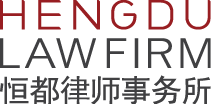So far, IPO approval has been granted to five companies listed on the NEEQ after its expansion: Jiangsu Flag Chemical Industry; Guangdong Topstar Technology (Topstar); Zhejiang Three Stars New Materials; Xiamen Guangpu Electronics (Guangpu); and Guiyang Xintian Pharmaceutical (Xintian). Upon review of filings submitted by these companies, including prospectus, attorney’s report and supplementary legal opinion, the authors note three issues that are mainly noticed by the China Securities Regulatory Commission (CSRC) when reviewing IPO applications from NEEQ-listed companies.

Managing and Founding Partner
Hengdu Law Firm
Trading of the listed share on the NEEQ
As a result of an applicant’s shares trading on the NEEQ, the CSRC was especially concerned about whether there was any transfer of benefits involving new shareholders, given that the prospective issuers had been listed on the NEEQ. In feedback to Guangpu, Topstar and Xintian, the CSRC requested “a description about trading of the issuer’s shares when they were being listed on the National Equities Exchange and Quotation” and, “examination on those who became shareholders after the issuer’s listing on the NEEQ, and a statement as to whether any affiliation or transfer of benefits was involved”.
According to replies from the three companies, Guangpu’s shares were traded only once and Topstar’s shares had never been traded when they were being listed on the NEEQ. Xintian’s shares were traded frequently on the NEEQ, but the trading volume represented made up just 1.58% of Xintian’s total share capital. Verification by intermediaries showed no abnormal transactions or transfer of benefits.
Feedback from intermediaries revealed that transactions in shares of the three companies were not complicated and had not resulted in the number of shareholders going beyond 200. Intermediaries had issued opinions based on statements from relevant shareholders and examination of details related to share transactions. However, these examinations of issuers frequently traded on the NEEQ was also supposed to be very time consuming.
Consistency of information disclosure
In feedback to Guangpu, the CSRC required the company to “state whether any significant inconsistencies exist between the key disclosures in the prospectus about ‘technical and business’ issues or ‘financial and accounting information and management analysis’, and those contained in public transfer instructions published on the NEEQ. If yes, please provide a detailed description of the inconsistencies and their reasons.” In its reply to the CSRC, Guangpu listed inconsistencies between the prospectus and NEEQ public transfer instructions in terms of disclosure about the issues mentioned above. However, the causes of such inconsistencies were not provided because the inconsistencies were considered immaterial by intermediaries.

Capital Market Associate
Hengdu Law Firm
In feedback to Topstar, the CSRC mentioned that “the sponsor should validate all public disclosures as well as any trading suspension and resumption of trading occurring to the issuer during the period when being listed on the NEEQ, to see if there are any inconsistencies within the disclosures contained in the filings and financial reports being submitted. If yes, please provide a checklist to elaborate.” Since the CSRC asked the sponsor to verify all inconsistencies, Topstar provided a checklist setting out detailed inconsistencies and reasons, which mainly included: (1) different disclosure requirements; (2) disclosures in the prospectus reflecting more facts of issuer; (3) supplementation to disclosure; and (4) correction to disclosure. No more feedback was offered from the CSRC in relation to the reply.
As revealed in the feedback and replies in the Topstar case, the CSRC attached great importance to inconsistencies between the IPO filings and any announcements made during the period when the issuer was being listed on the NEEQ. However, since the CSRC is ultimately aimed at ensuring honest disclosure by issuers, it did not look further into mistakes with immaterial impact on the eligibility for IPO, such as those that entailed “supplementation to disclosure” or “correction to disclosure”.
Three types of shareholders
In feedback to the five companies, the CSRC did not ask whether any equity was held by “three types of shareholders”, i.e., asset management plans, contractual funds and trust plans. Instead, it generally required the issuer to find out the ultimate investor of any shareholder who was a body corporate, and requested intermediaries to confirm whether any equity of the issuer was being held by trustees or parties acting in concert, and whether any transfer of benefits was involved.
In 2017, it seems that things have changed for issuers with “three types of shareholders”. The CSRC’s approval of the IPO applications of Nanjing Hicin Pharmaceutical and Hangzhou Changchuan Technology, in which both applicants included “three types of shareholders”, was thought to be a signal that “three types of shareholders” would no longer pose any systematic obstacle.
As a matter of fact, the IPO process of most companies with “three types of shareholders”, including Guangdong Hinabiotech and Bolaa Network, listed on the NEEQ, has come to a standstill. It is all about how “three types of shareholders” and underlying issues are considered.
Under the legal framework for the NEEQ, “three types of shareholders” are allowed to take part in private placements and transactions of NEEQ-listed companies. From the perspective of IPO review, however, there are concerns that these shareholders could be used to hold equity on behalf of third parties (including related parties), or as a conduit for transferring benefits, given the possibility that there can be plenty of shareholders behind them, especially in the case of investment strategies with multi-layer structures. Therefore, IPO prospects for NEEQ-listed companies with the “three types of shareholders” are still uncertain before any clear policy is enacted.
Since 2016, an increasing number of NEEQ-listed companies are cooking up an IPO, hoping to take a chance on the “accelerated IPO review”. Unluckily, NEEQ-listed companies are prone to having one or more of the above-mentioned problems. Insofar as the first and second issues (i.e., providing information about trading of the listed shares on the NEEQ and ensuring consistency of disclosures) are concerned, all they need to do is to disclose honestly, unless there are any devastating mistakes. As for the “three types of shareholders” issue, the hundreds of NEEQ-listed companies that want an IPO have to wait until the CSRC clarifies its attitude.
Author: Jiang Fengtao is the founding partner and Meng Dan is a capital market associate at Hengdu Law Firm
北京市东城区王府井东街8号澳门中心7层
邮编:100006
7/F, Macau Center, 8 Wangfujing East Street
Dongcheng District, Beijing 100006, China
电话 Tel: +86 10 5760 0588
传真 Fax: +86 10 5760 0599
电子邮箱 E-mail:
hengdulaw@hengdulaw.com
www.hengdulaw.com






















